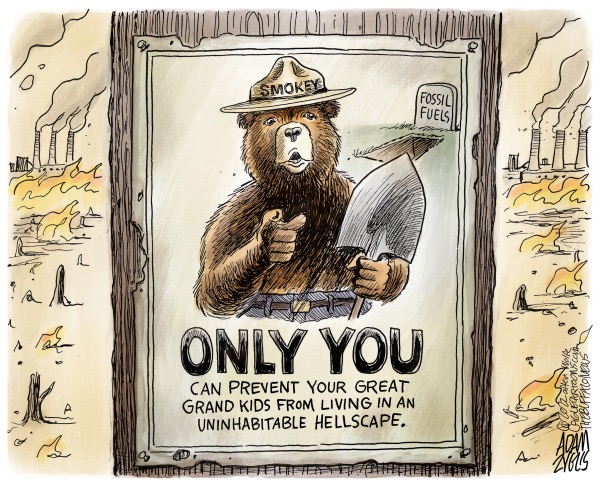On This Earth Day
Let's Renew the Bipartisanship that Created the EPA and Clean Air and Water Legislation

In 1970, the first Earth Day was propelled into existence by alarming images: pictures of dead, oil-soaked, birds, and seals from an oil spill off the coast of Santa Barbara; an Ohio river so polluted it caught fire; Los Angeles smog so toxic that “unhealthy to breath” days reached 200 that year. Millions of Earth Day demonstrators demanded action. Congress quickly established the Environmental Protection Agency and put in place national air and water quality standards.
Crucial to the success and endurance of these policies has been broad bipartisan support. While initiated under President Nixon, both parties have contributed to strengthening environmental legislation, that is, until recent years.
Today’s political polarization has set the parties on radically different approaches to environmental, energy, and climate policies. Republicans now align themselves closely with fossil fuel interests, favoring increasing support for coal, oil, and gas exploration, production, and distribution. Democrats have set goals to phase-out fossil fuels and are advocating a rapid transition to clean energy. Their landmark climate legislation, the Inflation Reduction Act (IRA) provides billions in subsidies and incentives to decarbonize our lives, homes, and transport.
On an opposite course, House Republicans last month passed an energy bill that would make it harder for environmentalists to block fossil fuel projects. If enacted this bill would repeal vital provisions of the IRA, such as funding to boost clean energy development and a planned tax to reduce methane pollution.
Despite radical differences, there is some hope for a bipartisan compromise. Both parties want to speed the permitting process for energy infrastructure. Republicans want to quickly build-out oil and gas infrastructure by expediting approvals for oil pipelines and offshore drilling. Democrats want our nation’s electricity to be generated more and more by clean renewable energy. They want miles of transmission lines built rapidly to connect a burgeoning number of large solar and wind energy projects to the national grid. In this case, Democrats may agree to remove barriers to both oil and gas developments and renewable projects knowing that economic factors favor renewable energy. The rapidly decreasing cost of wind and solar energy undercuts the economic feasibility of most fossil fuel projects. Indeed, in 2021, 83 percent of new energy capacity was clean energy.
Recently Congressional Republicans and Democrats have found common ground in climate policies that include a fee on carbon pollution, a cash-back dividend, and a border carbon adjustment mechanism. In recent years, four bipartisan bills were introduced offering versions of this approach. The most popular bill, the Energy Innovation Act, is expected to be re-introduced soon into the current Congress. Republicans favor this approach because it’s market-friendly, does not increase government, and protects businesses. Democrats value its provision of economic justice for lower income families. Both parties understand that a carbon border adjustment mechanism solves the dilemma of “should the U.S. decarbonize when China and other countries continue to expand use of fossil fuels.” A carbon tariff imposed by the U.S. at its borders would motivate all our trading partners, including China, to adopt similar policies.
It’s now 53 years since the first Earth Day awakened us to the emerging environmental crisis. Continuing a business-as-usual path will have dire consequences. We must come to grips with the enormous costs of burning more and more fossil fuels. In January 2020 the World Economic Forum released its Global Risks Report, which for the first time warned that the biggest risks to the economy are climate change-related disasters such as heatwaves, droughts, wildfires, floods, and sea level rise. A recent report by JP Morgan (a major fossil fuel financier) concludes that business-as-usual climate policy is “a threat to the human race.” And, the world’s largest financial assets manager, Black Rock, has warned that the climate crisis poses an “unprecedented challenge” to investors.
Coastal cities, like Santa Barbara, are projecting billions in costs to fortify seawalls and protect homes, businesses, and infrastructure from floods, wildfires, and other climate related disasters. Forbes reports that climate-related disasters over the past two decades have amounted to an estimated $2.25 trillion globally. Other recent studies claim that 9 million people die annually due primarily to air pollution from burning fossil fuels. Every day we fail to take climate action, the human and economic costs increase. We need our elected officials to act.
Fortunately for Santa Barbara, our Congressmember, Salud Carbajal, understands the climate crisis, and he is committed to working with his Republican colleagues. Carbajal has joined with Republicans in co-sponsoring bi-partisan climate legislation. He is a member of the bi-partisan House Climate Solutions Caucus.
This Earth Day let’s remind our elected officials, Republicans and Democrats, that we can achieve our climate goals if we rise above partisan interests and work together. We did it in the past; we can do it again. After all, a safe, healthy, livable world for ourselves, our neighbors, and future generations is what we all want.



